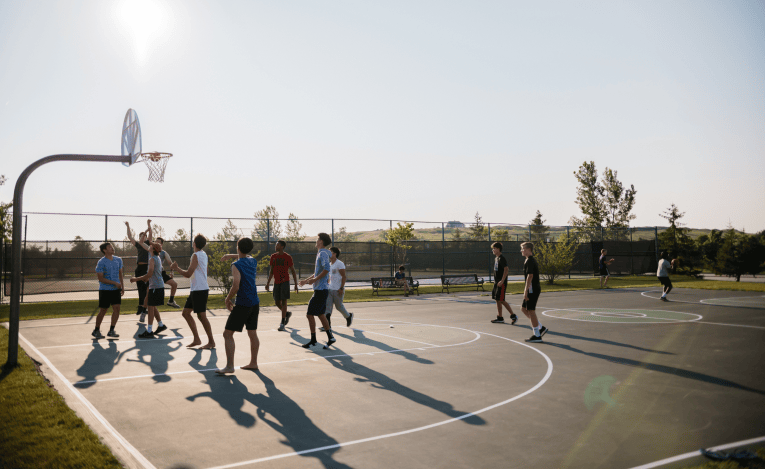
In the digital age, screen time and sedentary activities are highly prominent in teens’ daily lives. It is therefore even more important to highlight the importance of exercise and nutrition for their well-being. If they build healthy habits like regular exercise and balanced nutrition, they can both prevent chronic illness and improve their mental and physical health. For a teenager, good eating and exercise habits reduce stress, improve sleep quality and improve self-confidence.
Exercise for Teens: Benefits for Health
Exercise is essential for teens’ mental and physical health. It has many benefits, including:
- improving self-confidence and self-esteem so they feel better in their bodies,
- preventing depression, which affects many teens,
- strengthening bones and muscles to prevent injuries and osteoporosis later in life,
- improving sleep quality so they are more alert and focused,
- improving mental health: releases endorphins, the hormones that make us feel good and reduce stress and anxiety.
A few tips for including exercise in your teen’s daily life:
- Encourage them to play sports after school or on the weekend.
- Try to get them in the habit of walking or biking to school or extracurriculars.
- Make getting active fun with family outings that include physical activity, such as hiking or a game of tennis.
- Create a healthy environment in the home by limiting screen time and feeding them healthy and balanced meals.
When you encourage your teen to exercise regularly, you help them build healthy habits that contribute to their long-term physical and mental health.
Nutrition for Teens
A balanced diet has many advantages for a teen’s mental health. These include:
- reducing the risk of eating disorders (anorexia, bulimia, irregular eating habits), while encouraging healthy eating habits and avoiding restrictive or unhealthy diets,
- preventing obesity, by encouraging moderate consumption of fats and added sugars, while encouraging them to eat enough fruit, vegetables and whole grains. This nutritional strategy prevents obesity, which is a major risk factor for many chronic illnesses (cardiovascular disease, hypertension, diabetes),
- preventing chronic illnesses such as Type II diabetes, cardiac disease and some types of cancer in teens,
- strengthening the immune system by increasing consumption of essential vitamins and minerals. These nutrients are necessary for many bodily functions, including white blood cell production, which help fight infections and disease.
Healthy Habits
School-age children should get at least 60 minutes of moderate to vigorous physical activity per day. It should include movements that strengthen muscles and bones such as track and field, football, running, dance, biking or swimming, at least three times per week.
A balanced diet must include a variety of nutrients from all food groups: fruit, vegetables, whole grains, lean protein and low-fait dairy products. Nutrient-rich foods should be the priority (leafy greens, fruit, nuts and legumes). They provide a large number of vitamins, minerals and fibre with a low calorie content. It is important to avoid foods high in calories, fat and sugar, as well as fried food, sugary beverages and candy, which lead to excess weight gain and associated health problems.
It is also crucial to encourage your teen to proactively build healthy and balanced eating habits, by choosing nutritious ingredients and limiting processed foods and those high in sugar or saturated fats. When you help them understand the benefits of proper nutrition, they will be more motivated to make good eating choices and maintain a healthy lifestyle. Encourage them to help prepare meals and learn more about food and cooking, for example. This will help them better appreciate healthy food and eating habits.
Sports for Teens
For a stressed teen, jogging and biking are suitable ways to reduce stress. Other sports such as swimming, skiing, dance and rock climbing also reduce anxiety.
A shy teen will feel more comfortable in their social environment if they play team sports such as volleyball, basketball or football.
If your teen needs to lose weight, some sports are very efficient for burning calories and getting in shape: swimming, running, biking, volleyball, basketball, kickboxing, etc.
Some sports help teens build muscle mass, such as weightlifting. Gymnastics is also great for building muscles and improving flexibility. Combat sports build muscle power.
Athletics at École Galilée
Athletics are an important part of life at École Galilée because we believe firmly in the positive impact that physical activity has on teens’ overall growth. We offer regular opportunities for physical activity in order to improve their physical health, self-esteem and self-confidence. Sports also promote team spirit, social skills and discipline. By integrating athletics into our curriculum, we seek to promote a healthy lifestyle, positive values and growth in our students.We have also have a sports-study program for students at our middle school. Our Arts, Sports and Studies program offers classes at a reduced schedule so that students can take specific training in their field of interest (including sports) in addition to their general schooling. Our goal is to provide students with optimal conditions for developing their talents and skills while cultivating an environment that helps them succeed.

